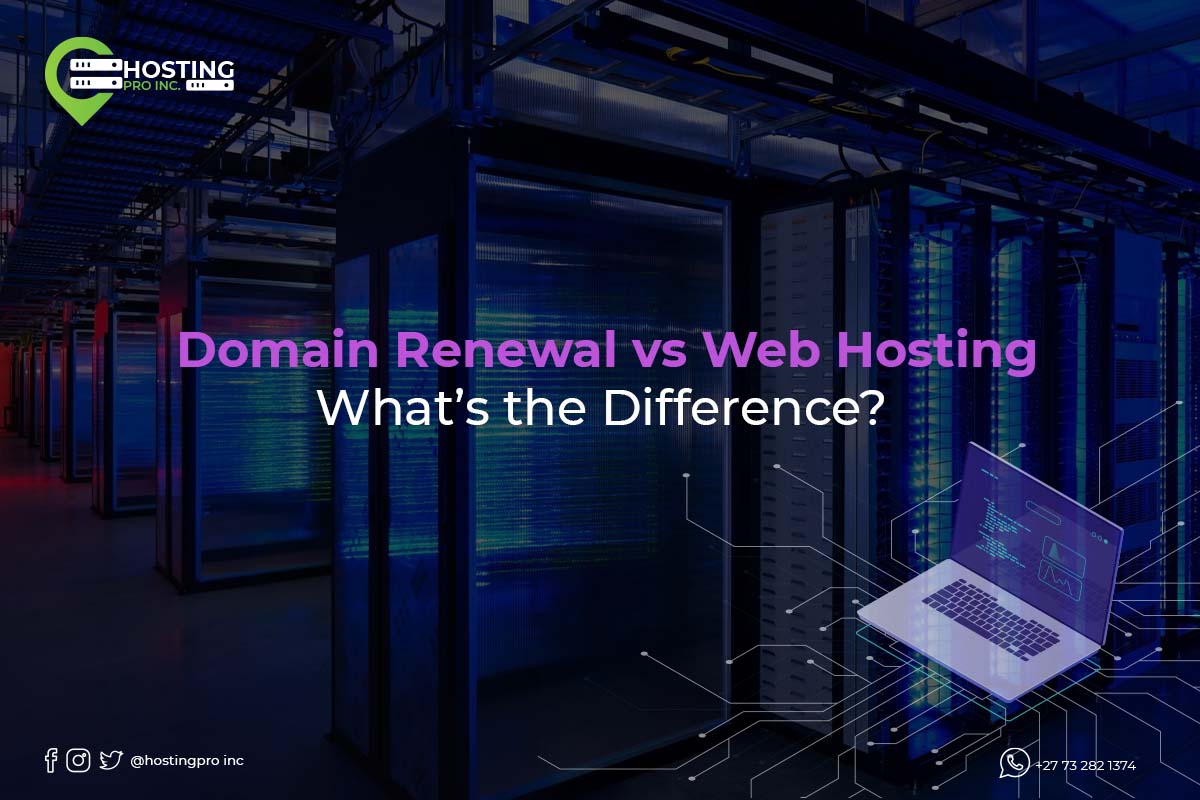
If you own a website, two key services keep it running: domain renewal and web hosting. Although they work together, they are very different things — and understanding the difference can save you money, prevent website downtime, and help you make informed decisions for your online presence.
1. What is a Domain Name?
Think of a domain name as your online address.
It’s what people type into their browsers to visit your website — for example:
- google.com
- yourbusiness.co.za
Behind the scenes, every website lives on a server with an IP address (like 192.168.1.1), but a domain name is a human-friendly way to remember and find your site.
2. What is Domain Renewal?
When you register a domain, you don’t “own” it forever.
Instead, you’re leasing the rights to use that domain for a specific period — usually 1 year at a time.
- Domain Renewal is the process of extending your lease so that you keep control of your domain.
- If you don’t renew on time, your domain can expire, go offline, and even be bought by someone else.
Example:
- You register
mycompany.co.zain March 2024 for 1 year. - In March 2025, it’s time to renew. If you skip renewal, the domain becomes inactive and could be taken by others.
Costs:
- Renewal prices vary based on the domain extension (.com, .co.za, .org, etc.) and the registrar.
.co.zarenewals are often cheaper than.comdomains.
3. What is Web Hosting?
If your domain is your address, web hosting is the land and building where your website lives.
It’s the service that stores your website’s files (HTML, images, videos, databases) on a server so visitors can view your site.
- Web hosting providers supply the server space and technology to keep your site online 24/7.
- When someone types in your domain name, their browser connects to your hosting server to display your site.
Main Types of Web Hosting:
- Shared Hosting – Affordable, multiple sites share the same server.
- VPS Hosting – Virtual private server with more control and power.
- Dedicated Hosting – Your own physical server.
- Cloud Hosting – Scalable hosting with resources on-demand.
4. Domain Renewal vs Web Hosting – Key Differences
| Feature | Domain Renewal | Web Hosting |
|---|---|---|
| Purpose | Keeps your domain name registered | Stores your website’s files online |
| Analogy | The street address of your home | The land and building |
| Billing Cycle | Usually yearly (can prepay for years) | Monthly or yearly |
| Without It | Visitors can’t find your website | Your site has no place to exist |
| Managed By | Domain registrar | Hosting provider |
5. Why You Need Both
To keep your website online, you must have both an active domain and hosting:
- Domain Renewal: Ensures people can still reach your website via your chosen name.
- Web Hosting: Ensures the website content is still stored and accessible.
Example:
- If you forget to renew your domain but keep hosting active → Visitors won’t find your site (your “address” no longer works).
- If you keep your domain active but cancel hosting → Your site shows “page not found” because there’s nothing to display.
6. Best Practices
- Renew domains early to avoid expiry — many registrars offer auto-renewal.
- Keep hosting and domain together if you prefer one provider, or separate them for more control.
- Monitor expiry dates and set reminders in your calendar.
- Use reputable providers to avoid service downtime.












